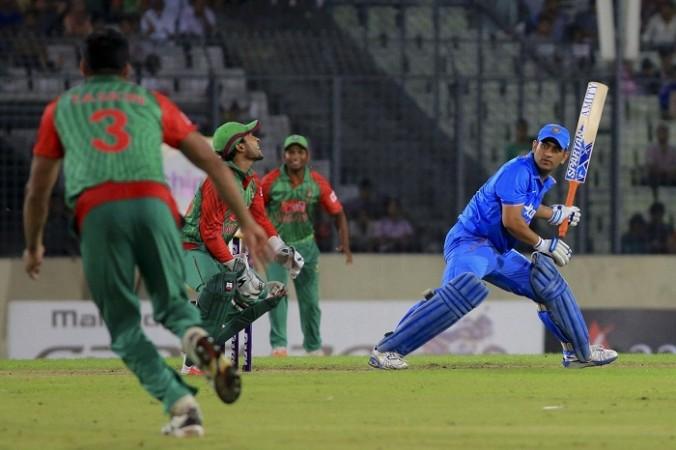
The reason behind India's dismal loss to Bangladesh in the 2nd ODI was obvious – batting. MS Dhoni, the India skipper, did not mince too many words when it came to that particular inept display, but what will concern fans and pundits alike was the manner in which the batsmen made the same mistakes, showing they had learnt nothing from the loss in the first one-day international against the same side and at the same ground.
While the woeful batting the 1st ODI can be chalked-up to a bit of "Oh we were taken by surprise by Mustafizur Rahman and the intensity of the Bangladesh bowler", there are no excuses for committing the same mistakes again, otherwise they might as well stop calling themselves professionals and come back.
The support staff are also culpable in that regard, which raises the question if India do need a permanent coach in the side, but the buck should stop with the batsmen, who, yet again, let a 19-year-old, as well as he bowled, run through them like a knife through hot butter.
"We need to put runs on the board," Dhoni said at the presentation ceremony. "We didn't get to a good start, and whenever there was a partnership we lost two wickets together. You have to take risks in such a game, but if you keep losing two wickets in a row, it becomes difficult to do so.
"If you have 200 on the board, it is quite easy for the other teams to chase so I won't blame the bowlers for this game. We as batsmen got starts, but we didn't make it big. Where we lacked was the fact that we lost wickets."
And most of those wickets came from poor decision-making. Had the batsmen shown a little more patience and ability to read the deliveries, wickets would not have fallen in clumps, which then gave Bangladesh added confidence and completely demoralised the willow-wilders of the team in blue.
While the batting was the undoubted failure, Dhoni also gave credit to the Bangladesh bowlers, who hunted as a pack, and got the results in glorious style.
"This is our first series loss against Bangladesh and it is very disappointing," Dhoni added. "In both the matches we were completely outplayed. It was a good wicket to bat on but we did not put enough runs on the board because of lack of partnerships.
"More than winning or losing it is the quality of cricket you play that matters. We did not play the kind of game in the last two games that we are capable of.
"We have lost to Bangladesh before this. But from first time we lost to them and today, there has been immense improvement in their team. Earlier they used to overly depend on their spinners but now they have good fast bowlers as well who know how to bowl the right lengths."
The batting order might start to look a little different if the results continue in the same vein, and one major change could be Dhoni coming up the order more often, like he did in the second ODI, pushing himself to No.4.
Dhoni's plan in the match on Sunday, which India lost by six wickets, was to go in early and smash a few over the ropes to put the pressure right back on Bangladesh, but wickets at regular intervals rendered that plan useless.
"The whole idea was for me to go up and play a little more freely," Dhoni said. "In the last four to five years I have just done the same thing -- tried to bat at 6 where there is some or the other kind of pressure and I haven't been able to bat freely.
"So, I wanted to go up and go after the bowlers. But by the time I got set we lost wickets and I had to build a partnership. It kept happening right through the innings and I could not do what I wanted to."
Dhoni, who geared up for this series by practicing with more aggressive intent after retiring from Test cricket, admitted he could make the No.4 position his own.
"I would like to bat a bit higher up the order and play freely," added Dhoni. "I have adapted to what the team needed off me since 2005-06 but in the longer run we have to try and find a player who will do that job for us.
"That's the reason why I dropped Raina down the order, because he has been successful in that [finishing] role. If I go up the order, there has to be someone experienced to take that No. 6 spot.
"It is a difficult position to bat because you either have to think three times before playing a big shot or you don't think at all because you are not worried about any pressure.
"Whatever changes we want to make, I think this is the right time. We have to think long-term. I know short-terms goals are equally important but we have to look at the larger picture of building a strong team for the future."

















